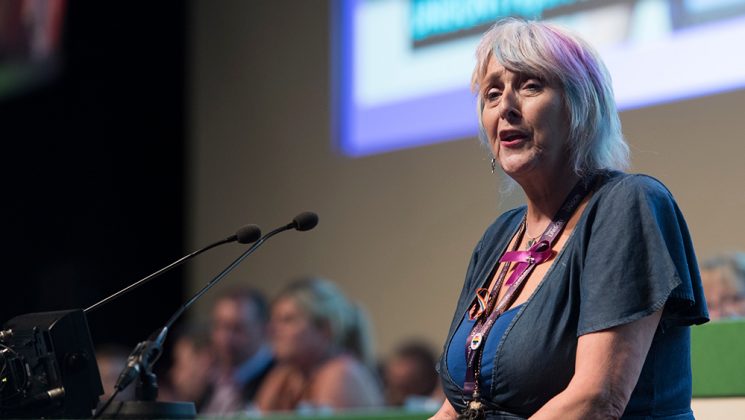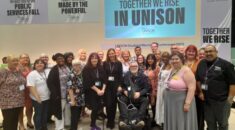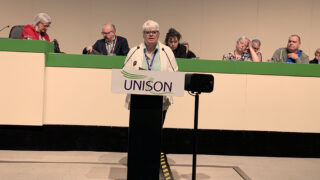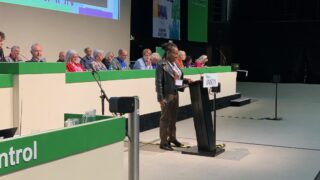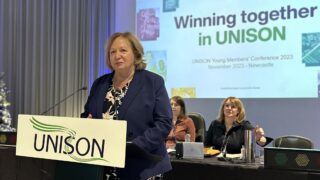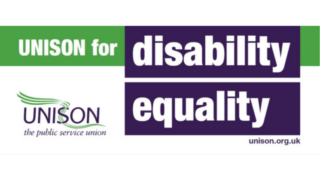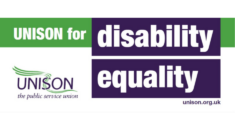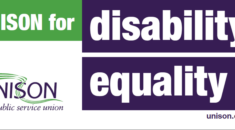Delegates took part in an impassioned debate on sexual harassment in the workplace in the final session of national conference in Liverpool, while also voting unanimously for 2021 to be designated the Year of Disabled Workers.
Pat Heron (pictured), speaking on behalf of women’s conference, argued that, with over a million women members UNISON must lead the way on fighting sexual harassment. “We must lead the way,” she said, “encouraging our branches and our women to come forward.
“We are all complacent if we don’t speak out,” she said.
“Members need to know UNISON will support them so they can be confident to report it to their union rep,” she continued. “Anyone at any time can suffer sexual harassment. Too often it’s not treated seriously, but treated as a joke.”
Arguing that four out of five people did not report sexual harassment in the workplace for various reasons – “Because your manager thinks it’s funny, because your job depends on keeping quiet…” – Ms Heron also pointed out that, in the aftermath of high-profile, celebrity cases of sexual harassment, “we have the responsibility to ensure that the sexual harassment discussion is about ordinary people in ordinary jobs.
“And if we think UNISON is free from sexual harassment in our structures, we should think again. We must have zero tolerance.”
A speaker from Milton Keynes branch gave her personal experience of sexual harassment, including being groped in the street at the age of 14. She argued that there was a lack of clear process in the reporting of sexual harassment in the workplace and that “UNISON should be leading the way on this”.
“We need to better educate managers,” she said. “UNISON should lead by example. Nobody should leave a job they love because of a boss or a customer or a colleague. They shouldn’t spend the day dodging the man who doesn’t get the message. I’m calling time up on sexual harassment in the workplace.”
Clare Dixon from the NEC said that sexual harassment “belongs in the dustbin of history” while James Tattershall, police and justice Lancashire branch, said he was speaking in the debate, “as its important for men to show support”.
2021 – The Year of Disabled Workers
In the debate on making 2021 the Year of Disabled Workers speakers argued that the current Year of Young Workers had paved the way for disabled members to raise their profile in a similar way.
For the national disabled members, Kath McGuinness said that, according to the government estimate of 156,000 UNISON members being disabled was “probably higher”.
“We face real problems at work,” she said. “Disabled workers find it more difficult to get a job, are paid less when they are in one and are often hounded out of their jobs.”
“The national disabled committee has already done lots of work, but let’s make UNISON the number one union for disabled members.”
Maggie Griffin from Greater London said that pay parity was so important for disabled workers. “We are not a tick box exercise,” she said. “We are real workers like everyone else. We need to raise our profile so much more. Not just in the workplace. And especially among young disabled people.”
Another speaker pointed out that not all disabilities are visible whilst there was a higher proportion of disabled workers in public sector. “The Year of Disabled Workers is a golden opportunity for UNISON to support disabled members.”
Nicola Moran, a young worker from the West Midlands, said that the Year of Young Workers was proving inspiring and empowering. “The Year of Disabled Workers seems a great supportive thing to do next,” she said.
“We need to raise disabled voices and show the union is an equal one. The government stands on disabled people again and again. We are diverse and we are strong. Let’s show it.”

